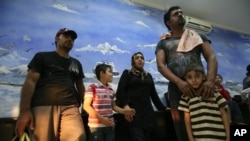SYDNEY — Australian lawmakers have passed new laws to set up offshore processing camps for asylum seekers in remote parts of the South Pacific. The government says the measures will stop a steady flow of unauthorized arrivals into Australia’s northern waters.
The vote in Australia’s lower house of parliament came after an expert panel, headed by a former defense chief, recommended reopening the camps in Papua New Guinea and Nauru as part of a range of measures to try to deter a steady flow of asylum seekers arriving by sea.
The offshore centers were used by the former conservative government a decade ago as part of its "Pacific Solution," which was established in response to a sharp increase in unauthorized arrivals. The camps on Manus Island in Papua New Guinea and the tiny island of Nauru were closed by the present Labor administration in 2008.
However, growing political pressure and a steady increase in the number of boats carrying asylum seekers from Indonesia and Sri Lanka have forced the government to reopen offshore camps.
The vote in Australia’s lower parliamentary chamber followed a marathon debate, during which opposition leader Tony Abbott again criticized Prime Minister Julia Gillard for taking so long to embrace offshore processing.
“I am not saying that any member of this house has blood on his or her hands. That would be grievously unfair. But Mr. Deputy Speaker, one thing is clear. This government's policy failures gave the people smugglers a business model and frankly, under the Westminster tradition, a minister of a prime minister who, in effect, repudiates his or her old policy to embrace a policy that he or she had always rejected in honor, in honor would resign," stated Abbott.
Critics of offshore processing say it is "inhumane" and could condemn desperate and vulnerable people to years in dusty camps in the South Pacific.
Greens party senator Sarah Hanson Young accused the government of adopting an “unthinkable” policy “in order to win the next election." Other opponents insist that people arriving by boat will be dumped and forgotten in isolated camps.
In the past detainees held on Nauru mounted hunger strikes to protest conditions and the length of their detention.
Earlier this week, an expert panel appointed by the Gillard government said offshore processing would act as a deterrent and protect the lives of asylum seekers who were willing to risk everything to come to Australia by sea.
The panel also recommended that Australia increase its annual intake of refugees from 13,000 to 20,000.
The new offshore processing laws will now be debated by Australia’s upper house of parliament, the Senate, later this week, where they are expected to be approved.
The vote in Australia’s lower house of parliament came after an expert panel, headed by a former defense chief, recommended reopening the camps in Papua New Guinea and Nauru as part of a range of measures to try to deter a steady flow of asylum seekers arriving by sea.
The offshore centers were used by the former conservative government a decade ago as part of its "Pacific Solution," which was established in response to a sharp increase in unauthorized arrivals. The camps on Manus Island in Papua New Guinea and the tiny island of Nauru were closed by the present Labor administration in 2008.
However, growing political pressure and a steady increase in the number of boats carrying asylum seekers from Indonesia and Sri Lanka have forced the government to reopen offshore camps.
The vote in Australia’s lower parliamentary chamber followed a marathon debate, during which opposition leader Tony Abbott again criticized Prime Minister Julia Gillard for taking so long to embrace offshore processing.
“I am not saying that any member of this house has blood on his or her hands. That would be grievously unfair. But Mr. Deputy Speaker, one thing is clear. This government's policy failures gave the people smugglers a business model and frankly, under the Westminster tradition, a minister of a prime minister who, in effect, repudiates his or her old policy to embrace a policy that he or she had always rejected in honor, in honor would resign," stated Abbott.
Critics of offshore processing say it is "inhumane" and could condemn desperate and vulnerable people to years in dusty camps in the South Pacific.
Greens party senator Sarah Hanson Young accused the government of adopting an “unthinkable” policy “in order to win the next election." Other opponents insist that people arriving by boat will be dumped and forgotten in isolated camps.
In the past detainees held on Nauru mounted hunger strikes to protest conditions and the length of their detention.
Earlier this week, an expert panel appointed by the Gillard government said offshore processing would act as a deterrent and protect the lives of asylum seekers who were willing to risk everything to come to Australia by sea.
The panel also recommended that Australia increase its annual intake of refugees from 13,000 to 20,000.
The new offshore processing laws will now be debated by Australia’s upper house of parliament, the Senate, later this week, where they are expected to be approved.









